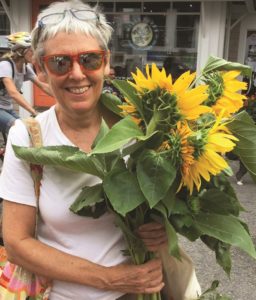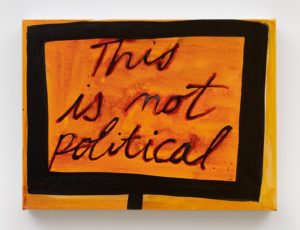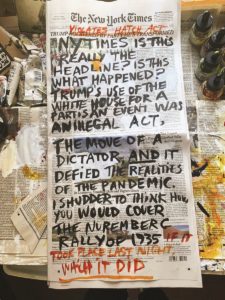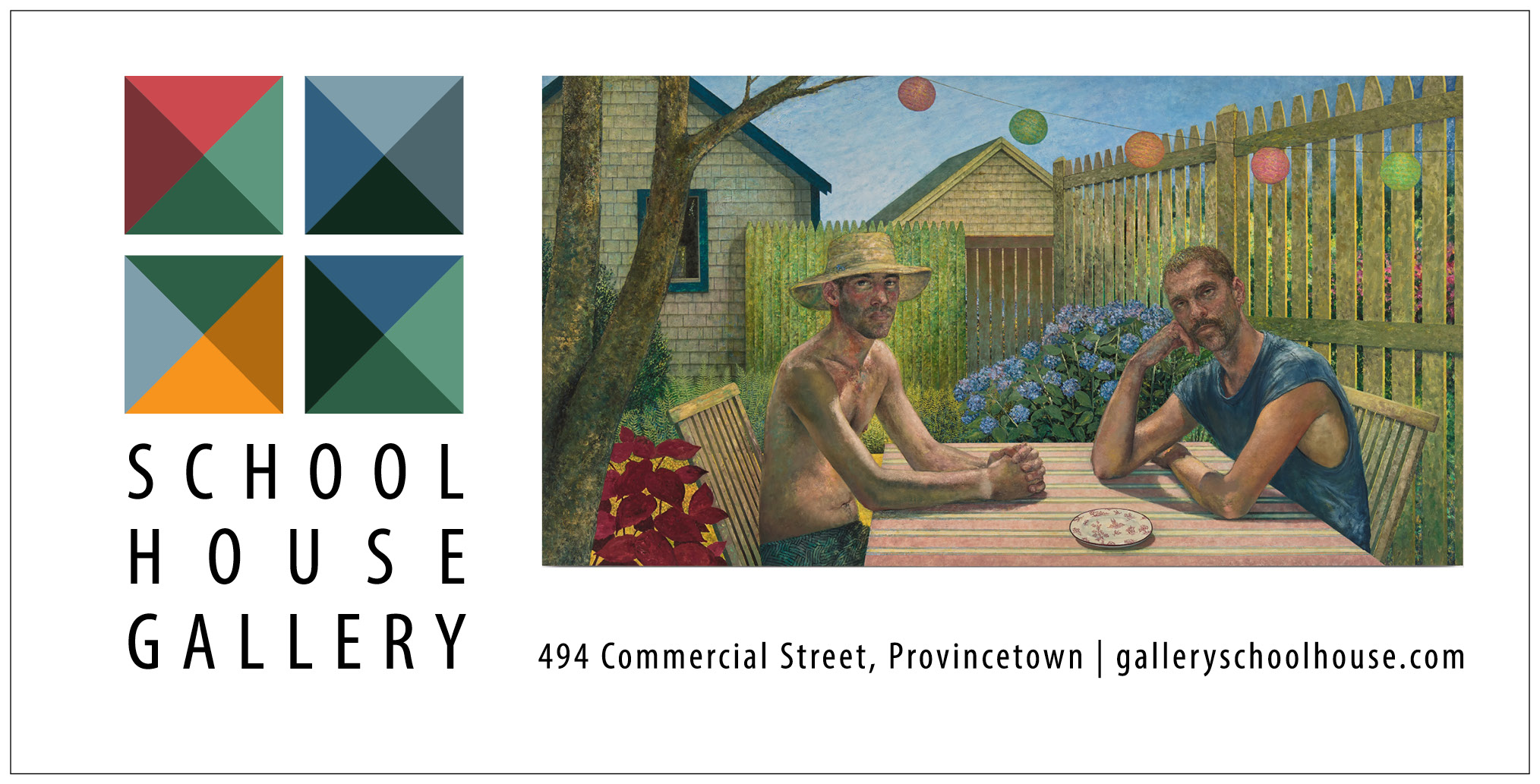“This is not political,” the painting proclaims. Its flowing script, on an orangey background, is surrounded by a rectangular black frame, anchored by a vertical post. At first glance, the piece, by artist Mira Schor, could be a protest rally sign. But think again: the “not” can be read ironically, echoing surrealist René Magritte’s famous line of text, under the image of a pipe: “Ceci n’est pas une pipe.”

To Schor, everything is political. And it’s fitting that the Fine Arts Work Center in Provincetown is using the painting to promote her upcoming virtual conversation, “Art and Activism,” with painter Anoka Faruqee, next Thursday, April 29. For both Schor and Faruqee, the role of artists in the political arena is an essential subject for discussion.
Schor is a scholar, painter, and essayist whose books — such as Wet: On Painting, Feminism, and Art Culture and A Decade of Negative Thinking: Essays on Art, Politics, and Daily Life — and artwork have been honored with numerous awards. In 2017, she was elected to the National Academy of Design. Beginning in the ’70s, when she was a graduate student at Cal Arts, the history of art and politics, especially feminist art, has been an essential part of her artistic practice. Her work has become more public and politicized since Trump’s inauguration in 2017.
Schor and Faruqee met at Skowhegan School of Painting & Sculpture in Maine two decades ago. Schor was the “teacher” and Faruqee, a recent M.F.A. graduate, was the “student” — Schor, interviewed virtually by the Independent, makes air quotes with her fingers around those words. “I followed her work as soon as she began to exhibit,” the older artist says.
The two reconnected when Schor, an associate professor at Parsons School of Design, saw Faruqee’s “Walk the Walk” fundraising project (@walktwalk2020) on social media. Faruqee, now director of graduate studies in painting and printmaking at Yale, targeted maneuvers aimed at voter suppression.

“Our conversation will be about how politics enters her more abstract artwork, and I will present my own artwork over the last four years — and work that I don’t actually consider art, such as New York Times ‘interventions,’ ” Schor says. “I am interested in exploring what it means to be a political artist. Anoka and I have different paths, but I think there are similarities.”
Schor’s “interventions” grew out of her frustration with the way the Times reported momentous events. A lifelong New Yorker and daily reader of the paper, she started annotating its front page. “I corrected and altered their coverage,” she says. “Sometimes, it was as simple as taking a marker and circling the words they were using. Other times, it got pretty elaborate.”
During the 2020 Republican convention, a page she posted online on Trump’s violation of the Hatch Act went viral. “Probably 12,000 people saw it — people who did not know who I was,” Schor says.
A gallery in Berlin, gathering work for a show titled “This Is America,” is exhibiting some of these interventions. Schor’s Manhattan gallery, Lyles & King, will show them alongside recent figurative paintings. Under consideration is a soft-cover book the size of the Times with several dozen of her best word-rants.
“I don’t want to sell them,” Schor says. “They are part of a historical record I want to keep intact.” She hopes, at some point, to have them become part of the archives of the New York Public Library or New-York Historical Society.
Archiving her work, as well as the artwork of her parents, has been much on her mind lately. That’s because a student researcher associated with the Academy of Fine Arts in Warsaw, Poland contacted her about a podcast on women who went there, including Schor’s mother, Reisa. Schor shared biographical material on Reisa, and on her father, Ilya — her parents, both artists, met as students at the academy in the 1930s.

Fleeing war-torn, Nazi-dominated Europe in 1940, the couple moved to New York, where Ilya, a painter and engraver, created artwork in the spirit of Eastern European Jewish culture. When he died, at age 57, Reisa, with two young girls to care for, “picked up his tools,” Schor says. “She had been an abstract painter, and quickly learned to make objects in her own style — not as refined as his, but more muscular, more sculptural, and, at the time, very contemporary.
“Her artwork, her jewelry, and the satisfaction she got from it was a major element in our lives,” Schor continues. “It gave her the confidence to buy a house in Provincetown. She would bring her tools from New York and spend long seasons in town.” The compact East End home that Reisa bought in the early ’70s has been in the family ever since.
Provincetown has been a source of inspiration for Schor. As a young child, she says, “I loved the beach, I played with the sand. You know how the sand in Provincetown goes from tan, to rust, to black? These are the colors I use in my work. The landscape, those skate egg cases, gave me forms that entered into my work.”
When she comes to Provincetown, “spending two months, on average, it’s like I push a reset button,” Schor says. “Over 50-plus years, painting in Provincetown probably accounts for more than 50 percent of my artwork.”
While she’s here, she also goes for daily swims in the bay, gathers vegetables and flowers at the Ryder Street farmers market, and sees old friends. But perhaps most of all, she lives surrounded by objects from her family’s history, and embodies her parents’ legacy of art and activism.
In These Times
The event: “Art and Activism,” a conversation between Mira Schor and Anoka Faruqee
The time: Thursday, April 29, 6 to 7:30 p.m.
The place: Virtual presentation of the Fine Arts Work Center in Provincetown; register at fawc.org
The cost: $25 minimum donation



